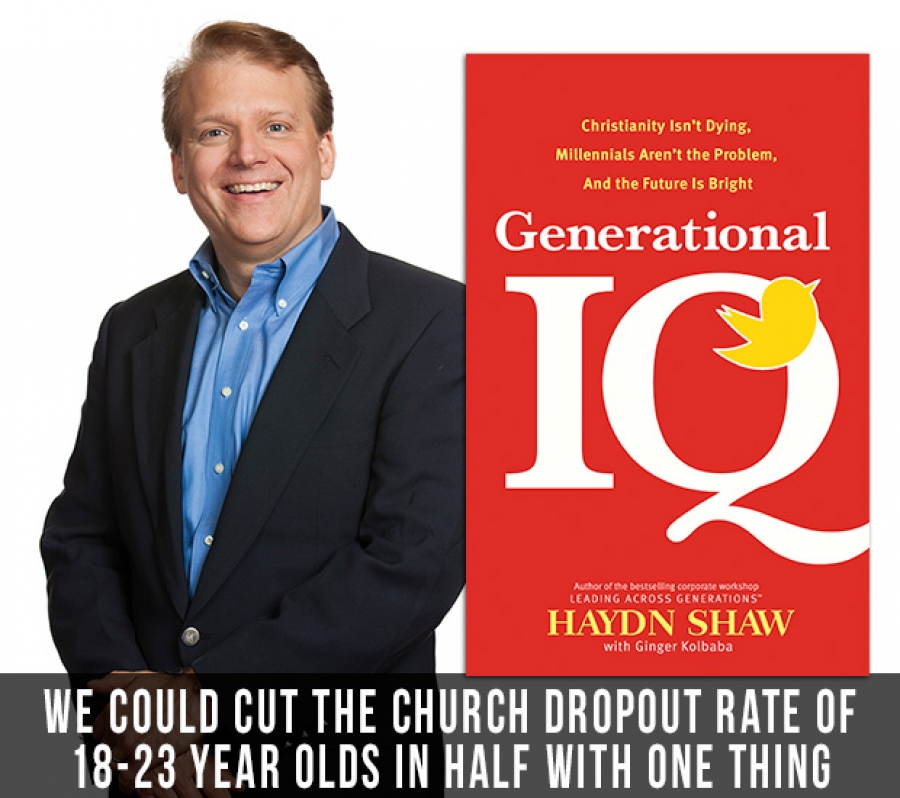By Haydn Shaw
About 70 percent of young people, ages 18 to 23 (currently the “millennial” generation), will drop out of church for at least a year. Even more alarming, a third of them won’t return. They join the “Nones” — those who claim no religious affiliation. Or they remain Christian, but their faith fades into the background like wallpaper on a laptop screen.
There are many reasons young people drop out of church. Although there is no magic formula for stopping them, there is one thing that could dramatically decrease that number.
It isn’t campus ministries, though I’ve heard hundreds tell me how these programs have impacted their lives. It isn’t mission trips. The research on them is discouraging, even though no generation in history has done more of them than millennials. It isn’t young adult programs for high school graduates, though we need to put more focus on the most underserved group in churches today.
So, what is it?
It’s relationships with people from older generations — people who (in addition to parents) come alongside young people and help them figure out the confusing, exciting, dangerous, and amazing life stage between adolescence and settled adulthood.
According to Barna Group, millennials who remain involved in church after their teen years are “twice as likely as those who don’t to have a close personal friendship with an older adult in their faith community (59 percent versus 31 percent).”
Moreover, these relationships are what works the best with younger, hard-core “Nones.” When Barna Group asked un-churched millennials how churches could draw them in, the tactic they rated highest (at 14 percent) was a regular connection with older people who shared life experiences with them. Relationships with adults of older generations are that powerful.
I was stunned that the solution could be so simple. I think the complexity of ministry to 18 to 23 year olds has us so overwhelmed that we missed it: small contacts matter. Texting them while they are away at college. Stopping to talk to them when you see them at church. Checking in to see how they’re doing. Staying in contact with them, even in small ways, can potentially keep them in the faith.
Young adults need someone they can talk to about topics they might feel uncomfortable discussing with a parent (e.g. saving sexual intimacy for marriage). Emerging adults also need a safe place to talk about their doubts and think through hard questions. Sometimes, parents are so invested in their children’s lives that they can’t offer an unbiased or non-judgmental perspective.
Research shows one of the biggest factors in young people leaving Christianity (and not returning) is having doubts about their faith but no one they can talk to. Instead of waiting for millennials to come to you, reach out to let them know that doubts are normal. Show them they’re welcome to talk to you when they have questions. You don’t have to have all the answers. You don’t have to know a lot about the Bible or theology. All you need to do is listen and not freak out when they have uncertainties.
Millennials respond to authenticity, not perfection. So don’t pretend you have it figured out. We need to tell stories that show them that living God’s way can (and has) been done, despite some bumps in the road. Whatever your story, share what you’ve learned about finding your identity in God.
We need the older generations to get involved in millennials’ lives. Surveys show that millennials know that older generations have a lot to share with them, even if they’ve messed up along the way. Just by reaching out, you could help dramatically increase the number of millennials who stay in (or return to) church. It’s that simple. ![]()










